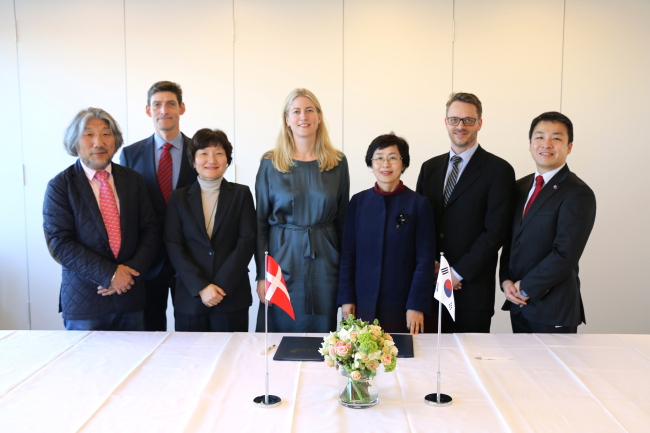Denmark, Korea cooperate in sustainable agriculture
By Korea HeraldPublished : April 3, 2017 - 17:50
The leading food and agricultural institutes of Denmark and Korea signed a cooperation agreement in late March to pave the way for joint programs in education and training, innovation and entrepreneurship.
According to the Danish Embassy in Seoul, the Korea Agency of Education, Promotion and Information Service in Food, Agriculture, Forestry and Fishery (EPIS) inked a memorandum of understanding with SEGES, a subgroup under the Danish Agricultural and Food Council.
The two organizations will conduct training programs and overseas workshops on agricultural modeling using information communications technology and smart farming technologies targeting farmers, farm managers, agricultural advisers, rural youths and other stakeholders. They will also share knowledge on state policies and projects involving public-private partnerships.
The collaboration is expected to be a catalyst in human resource development, youth employment, startup creation, consultations and innovation in information and communication technology and automation, according to EPIS.
According to the Danish Embassy in Seoul, the Korea Agency of Education, Promotion and Information Service in Food, Agriculture, Forestry and Fishery (EPIS) inked a memorandum of understanding with SEGES, a subgroup under the Danish Agricultural and Food Council.
The two organizations will conduct training programs and overseas workshops on agricultural modeling using information communications technology and smart farming technologies targeting farmers, farm managers, agricultural advisers, rural youths and other stakeholders. They will also share knowledge on state policies and projects involving public-private partnerships.
The collaboration is expected to be a catalyst in human resource development, youth employment, startup creation, consultations and innovation in information and communication technology and automation, according to EPIS.

SEGES was established by Danish farmers and has partnerships with 30 advisory groups owned by farmers across the country. As a leading agricultural education and advisory organization in the country, SEGES and its partner groups employ some 3,200 specialists and work with related local consulting firms. Their clients are more than 30,000 Danish farmers, 1,000 horticulture enterprises and 5,000 small and medium-sized enterprises.
“I’m proud to say that Denmark is a world leader in organic food sales,” Danish Ambassador to Korea Thomas Lehmann told The Korea Herald, adding his country accounts for 8.4 percent of the world’s total sales. “We have a strong international profile in organically produced healthy food.”
Denmark was the first country in the world to implement state regulations over organic food in 1987, covering food safety and quality control. The key to Denmark’s success lies in the close cooperation between public and private entities, according to the envoy.
“Our government plays a key role in enhancing organic food production by taking a market-driven approach,” he stressed, mentioning business consortiums initiated by the Ministry of Food and Environment.

“The state also conducts rigorous controls and evaluations to ensure the highest standards in production, processing and storage. The Organic Cuisine Logo at restaurants also verifies the use of healthy ingredients.”
The production of food, animal feed and ingredients was decoupled from contributing to climate change, Lehmann emphasized, adding Denmark has reduced greenhouse gas emissions by 16 percent while raising agricultural output by 20 percent since 1990. “Climate-smart” agriculture, using innovations in crops and animal breeding, has been a key factor.
Noting that Denmark and Korea have been strong trade partners, the ambassador said his country aims to export more pork, poultry, beef, berries, beer and dairy products of butter, cheese, yogurt, ice cream and milk to Korea.
Denmark, a global renewable energy pioneer, is also embracing urban farming to respond to the challenges of urban development and climate adaptation, the diplomat said.
Rooftops across Danish cities, including capital Copenhagen, are covered by green plots, where people grow crops, plants or grasses, he noted. “Rooftop greening also helps reduce rainwater runoff, cool down the city temperature and increase biodiversity.”
By Joel Lee (joel@heraldcorp.com)
-
Articles by Korea Herald


![[AtoZ into Korean mind] Humor in Korea: Navigating the line between what's funny and not](http://res.heraldm.com/phpwas/restmb_idxmake.php?idx=644&simg=/content/image/2024/04/22/20240422050642_0.jpg&u=)
![[Exclusive] Korean military set to ban iPhones over 'security' concerns](http://res.heraldm.com/phpwas/restmb_idxmake.php?idx=644&simg=/content/image/2024/04/23/20240423050599_0.jpg&u=20240423183955)



![[Graphic News] 77% of young Koreans still financially dependent](http://res.heraldm.com/phpwas/restmb_idxmake.php?idx=644&simg=/content/image/2024/04/22/20240422050762_0.gif&u=)
![[Herald Interview] Why Toss invited hackers to penetrate its system](http://res.heraldm.com/phpwas/restmb_idxmake.php?idx=644&simg=/content/image/2024/04/22/20240422050569_0.jpg&u=20240422150649)






![[Exclusive] Korean military to ban iPhones over security issues](http://res.heraldm.com/phpwas/restmb_idxmake.php?idx=652&simg=/content/image/2024/04/23/20240423050599_0.jpg&u=20240423183955)



![[Today’s K-pop] Ateez confirms US tour details](http://res.heraldm.com/phpwas/restmb_idxmake.php?idx=642&simg=/content/image/2024/04/23/20240423050700_0.jpg&u=)